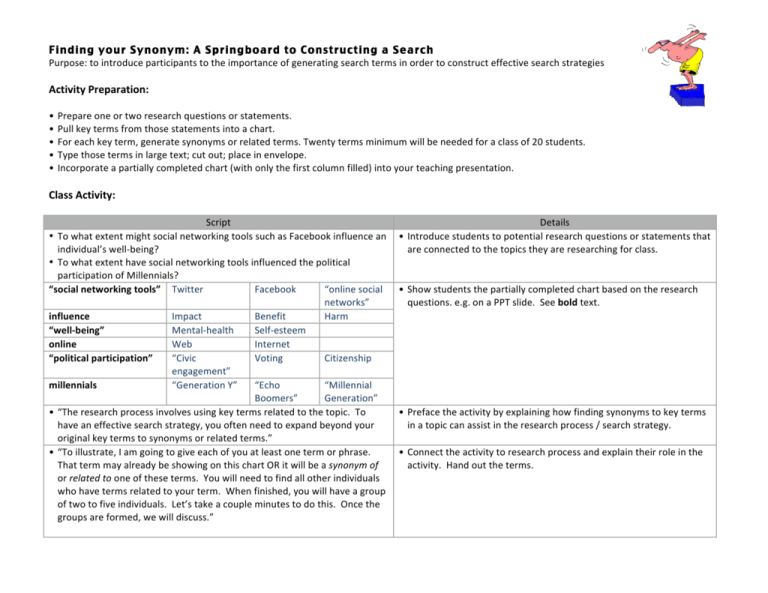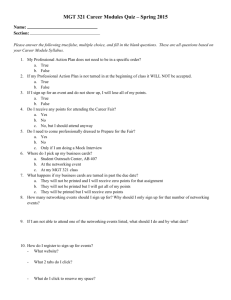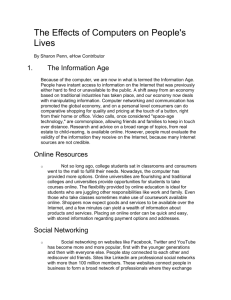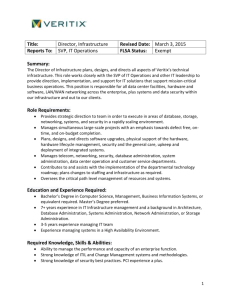Finding your Synonym handout
advertisement

Finding your Synonym : A Springboard to Constructing a Search Purpose: to introduce participants to the importance of generating search terms in order to construct effective search strategies Activity Preparation: • • • • • Prepare one or two research questions or statements. Pull key terms from those statements into a chart. For each key term, generate synonyms or related terms. Twenty terms minimum will be needed for a class of 20 students. Type those terms in large text; cut out; place in envelope. Incorporate a partially completed chart (with only the first column filled) into your teaching presentation. Class Activity: Script • To what extent might social networking tools such as Facebook influence an individual’s well-­‐being? • To what extent have social networking tools influenced the political participation of Millennials? “social networking tools” Twitter Facebook “online social networks” influence Impact Benefit Harm “well-­‐being” Mental-­‐health Self-­‐esteem online Web Internet “political participation” “Civic Voting Citizenship engagement” millennials “Generation Y” “Echo “Millennial Boomers” Generation” • “The research process involves using key terms related to the topic. To have an effective search strategy, you often need to expand beyond your original key terms to synonyms or related terms.” • “To illustrate, I am going to give each of you at least one term or phrase. That term may already be showing on this chart OR it will be a synonym of or related to one of these terms. You will need to find all other individuals who have terms related to your term. When finished, you will have a group of two to five individuals. Let’s take a couple minutes to do this. Once the groups are formed, we will discuss.” Details • Introduce students to potential research questions or statements that are connected to the topics they are researching for class. • Show students the partially completed chart based on the research questions. e.g. on a PPT slide. See bold text. • Preface the activity by explaining how finding synonyms to key terms in a topic can assist in the research process / search strategy. • Connect the activity to research process and explain their role in the activity. Hand out the terms. • “You will have to talk and move to find your group members.” • “OK, let’s fill in the chart. Which group has the term X (e.g. social networking tools)? What other terms are in your group?” • “Great. Now we have additional terms we can use in our search. Even though you may not explicitly brainstorm related terms for every topic you are researching, you are often doing this informally or finding related terms during the research process. e.g. ‘Oh, I noticed that when I searched for social networking tools that Web 2.0 is mentioned.’” • “Now that we have terms, we can use some of these in a search strategy.” • Monitor activity. Encourage students to participate. • Call students to attention. Ask which group has term X (e.g. social networking tools). Ask students for the other terms in their group. Based on student feedback, fill in the chart (e.g. type into a table in a Word document, write on a whiteboard, Smartboard etc.). If an individual (and associated term) is in the wrong group, I will sometimes write the term in the wrong row and discuss later or ask if it is better suited for another category. Some terms have an obvious connection to a given term while others may be more difficult. • I mention that though you do not always go through an explicit brainstorming session for related terms for your topic, you are often doing this during the research process e.g. looking for terms that help to explain your topic. • From this activity, I tend to transition into Boolean operators and constructing a search. I will use some of these terms to demonstrate searches in one or more databases. Examples: Colleges should be actively recruiting male students to attend their programs. University College “Higher education” Recruit Attract Admissions Registrar Enrollment Gender Male Female “Affirmative action” “Admission preferences” “Gender gap” Gender inequity Gender imbalance Debate Controversy/controversial Pro Is the portrayal of women in video games biased toward gender stereotypes? Gaming “Video games” “Electronic games” Portrayal Depiction Representation Women Gender Girl Media Film Television Applicants Men “Male minority” Con Women Benefits “Massively multi-­‐player” Characterization Female Advertising “Grand theft auto” Stereotype Sara Davidson sdavidson2@ucmerced.edu UC Merced Library http://ucmercedlibrary.info June 2010, LOEX-­‐of-­‐the-­‐West Presentation Clip Art: Microsoft Art Online j0121085.wmf






